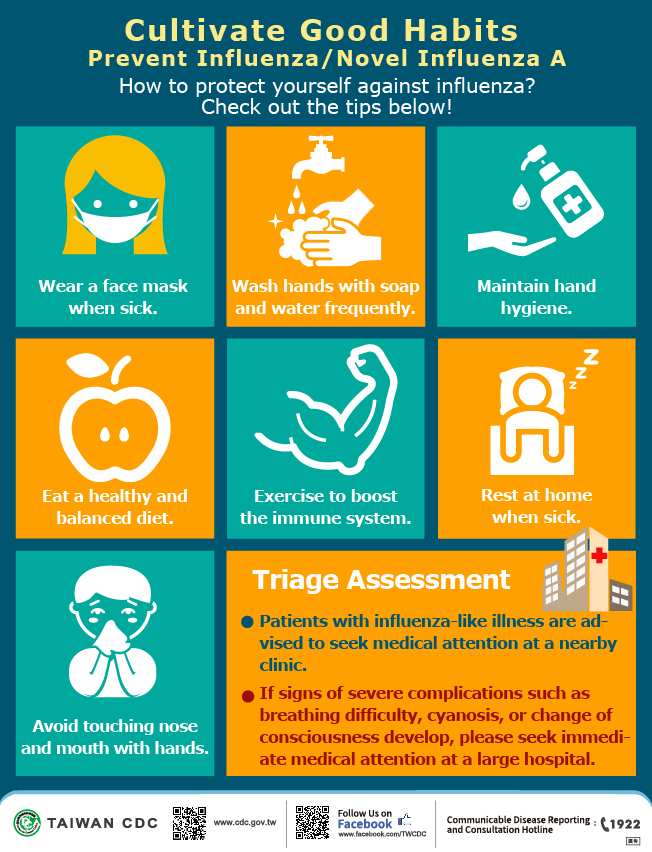Influenza
Influenza
Prevention and Control
- The best way to prevent influenza is with annual vaccination. Taiwan CDC recommends that people at high risk for developing serious complications from influenza, and people who live with or care for high risk individuals get vaccinated each influenza season. Such individuals include:
- children and adolescents aged 6 months through 18 years, especially those <5 years
- adults aged 50 and above, especially elderly people (≥65 years of age)
- residents in nursing homes andother long-term care facilities (including employees)
- pregnant women at any stage of pregnancy
- parents of infants within 6 months
- lindividuals with chronic medical conditions,?including those with BMI≧30, rare diseases, or major illness/injury
- health care and public health personnel
- kindergarten caretakers and child-care professionals
- poultry farmers and animal health inspectors
- Maintain good personal hygiene, including washing hands regularly with soap and water, covering nose and mouth with a tissue when you coughing or sneezing.
- Seek immiate medical attention when respiratory symptoms such as fever, cough, sore throat and running nose develop, so that complications caused by influenza such as pneumonia and encephalitis, may be prevented.
- When sick, rest at home. Put on a mask when visiting public places. Cover nose and mouth when coughing or sneezing in order to prevent other people from getting sick too.
- If you experience symptoms such as fever, please wear a mask, seek medical attention, and immediately contact the Division of Health Services at 03-5743000 during office hours (Monday to Friday, 08:00-17:00) or the Division of Student Assistance at 03-5711814 (24 hours).
FAQs
- What is seasonal influenza?
- Seasonal influenza is caused by influenza viruses, which infect the respiratory tract (i.e., the nose, throat, lungs). Unlike many other viral respiratory infections, such as the common cold, the influenza can cause severe illness and life-threatening complications in many people.
- When is the influenza epidemic period in Taiwan?
- In Taiwan, the influenza epidemic period occurs in the winter, from late November through March. The peak of epidemic period has usually occurred during the Chinese New Year. The overall health impact (e.g., infections, hospitalizations, and deaths) of a season varies from year to year. Taiwan CDC monitors circulating flu viruses and their related disease activity and provides influenza reports (called “Influenza Express”) each week from October through May.
- How does influenza spread?
- The main way of influenza viruses spreading is from person to person through respiratory droplets of coughs and sneezes. These droplets can land in the mouths or noses of people who are nearby or possibly be inhaled into the lungs. Less often, a person might also get flu by touching a surface or object that has flu virus on it and then touching their own mouth or nose. To avoid this, people should stay away from sick people and stay home if sick. It is also important to wash hands often with soap and water.
- If I got influenza, will I need to report to Taiwan CDC?
- In Taiwan, influenza is not one of the notifiable diseases. Influenza cases are not required to be reported. However, “Severe Complicated Influenza” is one of the Category IV Notifiable Diseases. Patients with serious influenza complications who need ICU treatment and associated deaths are required to be reported within one week’s time.
More information
- Taiwan National Infectious Diseases Statistics System (NIDSS)
- National Notifiable Disease Surveillance System
- WHO: Influenza (Seasonal)
- USCDC: Seasonal Influenza: Flu Basics
Images

Attached Files
7 Things you may not know about pregnancy.jpg
Cultivate Good Habits to Prevent Influenza and Novel Influenza A.jpg
Click Num:


